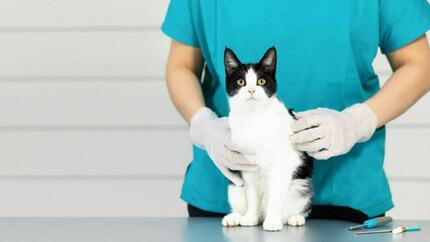

If your cat has developed an unusual cough lately, you’re probably wondering ‘why is my cat coughing’ and what to do about it. Although it can be disturbing for owners to see their cat coughing and wheezing, this is not uncommon in the feline kingdom and it’s often a sign of the occasional hairball your pet is trying to get rid of. However, a simple cough can quickly get a bit more complicated when we take into consideration all the possible issues with their nose, throat and lungs that could cause this symptom. And even your cat’s heart might have something to do with it.
This means your cat’s cough riddle is best left for the vet to solve. But while you wait for the appointment, here are some of the possible reasons why your cat is coughing.
Why is your cat coughing? Top 6 possible reasons
Is it an allergy attack, asthma or a lung infection? There are many possible causes for a cat’s sudden coughing fit. Even something as inconspicuous as dust can trigger all that feline coughing and wheezing. The list is long, but we’re breaking it down for you. Here are some of the reasons your cat might start coughing more than usual.
1) Asthma
Feline asthma can be triggered by pollen, mould, dust mites, smoke or other allergens that can cause inflammation of the airways when inhaled. Cat cough is one of the main symptoms to look out for, but it’s usually not the only one.
Wheezing, rapid breathing, vomiting and lethargy are also signs that your cat might be suffering from asthma.
Although feline asthma can’t be cured, there are many treatments available including inhalers, injections and pills. These won’t make the underlying condition disappear, but can help a struggling cat breathe normally again. Allergen testing is often recommended as well. This will narrow down the list of possible allergy triggers and once you find out what exactly in the cat’s environment is causing the asthma attacks, you can start minimising your pet’s exposure to it.
2) Hairballs
Cat hairballs are a natural consequence of your pet’s self-cleaning habits. During their grooming process, cats swallow hair which sometimes accumulates in their stomach and forms hairballs. Cats will normally try to eliminate the hairball through coughing, retching and gagging. All this effort is so that the hairball doesn’t end up in their intestines causing a blockage. Still, it can be a disturbing sight for owners to see their cats struggling through the process.
So, if you’re wondering why is your cat coughing, the answer might be that they’re just trying to get rid of a hairball. However, this shouldn’t happen more than once a month. If you noticed an increased frequency in your cat’s coughing, retching and gagging, you should visit the vet to rule out other issues.
3) Pneumonia
Feline pneumonia is one of the more serious causes of cat coughing and you should immediately contact the vet if your cat is having any problems breathing, coughing or if you noticed any discharge from the eyes or nose. Pneumonia is inflammation of the lungs, normally caused by infection, the condition can result in a build-up of fluid inside the lungs, which means that if the process is left to continue, the lungs will keep filling up with fluid instead of air and your pet will not be able to breathe at all. This is why it’s so important to recognise that this condition is an emergency and get professional help as quickly as possible if you notice any unusual symptoms related to your cat’s breathing.
4) Respiratory infections
A respiratory infection can also make your cat cough and wheeze. Viral, bacterial or fungal infections are common in cats and they often come with a lot of coughing, sneezing, sniffling and lethargy. Cats can also catch feline flu, so if you also notice a runny nose or a change in appetite, this might be the explanation for all those sudden coughing fits. Fortunately, a kitten or cat that’s up-to-date with their vaccinations has a lower chance of catching the flu.
If you notice a stubborn, unusual cough in your pet, it’s always best to talk to your vet and rule out any respiratory infections.
5) Cancer
Cancer in cats can also affect their respiratory tract. Sometimes, when tumours develop in the lungs, throat or mouth, they can trigger a cat cough that won’t go away. Rapid breathing, lethargy or coughing up blood are some of the most common signs of lung cancer. As with any type of cancer, catching it early can increase the chances of a positive prognosis. So, keep an eye on any unusual changes in your cat’s behaviour and symptoms and don’t hesitate to contact the vet.
6) Foreign objects
Sometimes it might just be that your cat has inhaled a tiny object on their daily roaming trips and is now coughing up a storm to get rid of it. Even food can end up in the wrong place and coughing is a natural instinct in this situation.
Although cats will normally do their best to expel foreign objects and food that has become stuck in their airways through sneezing and/or coughing, they can sometimes become lodged, so if your cats coughing doesn’t improve it’s important to get in contact with your vet.
When to be concerned about why your cat is coughing
Coughing in cats can be harmless. Just as we humans cough occasionally without needing medical attention, so do our feline companions. But it’s important to notice if the cough persists for days or if it’s particularly severe, contact your vet straight away.
Fortunately, many of the conditions we listed above, such as asthma or respiratory infections, can often be treated or managed. If you’re worried about your cat suffering from more severe illnesses such as cancer, here is a handy guide with information on a particular type of cancer affecting felines, cat lymphoma.
Recommended by Pro Plan:
Related articles









